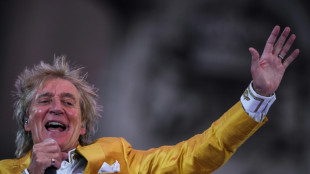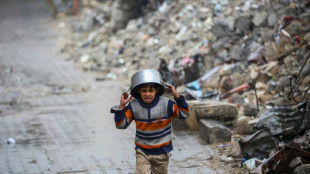
-
 Laos hostel staff detained after backpackers' deaths
Laos hostel staff detained after backpackers' deaths
-
Hong Kong LGBTQ advocate wins posthumous legal victory

-
 Ukraine says cannot meet landmine destruction pledge due to Russia invasion
Ukraine says cannot meet landmine destruction pledge due to Russia invasion
-
Rod Stewart to play Glastonbury legends slot

-
 Winter rains pile misery on war-torn Gaza's displaced
Winter rains pile misery on war-torn Gaza's displaced
-
'Taiwan also has baseball': jubilant fans celebrate historic win

-
 Russia pummels Ukraine with 'record' drone barrage
Russia pummels Ukraine with 'record' drone barrage
-
Paul Pogba blackmail trial set to open in Paris

-
 China's Huawei unveils 'milestone' smartphone with homegrown OS
China's Huawei unveils 'milestone' smartphone with homegrown OS
-
Landmine victims gather to protest US decision to supply Ukraine

-
 Indian rival royal factions clash outside palace
Indian rival royal factions clash outside palace
-
Equity markets retreat, dollar gains as Trump fires tariff warning

-
 Manga adaptation 'Drops of God' nets International Emmy Award
Manga adaptation 'Drops of God' nets International Emmy Award
-
China's Huawei launches 'milestone' smartphone with homegrown OS

-
 Philippine VP denies assassination plot against Marcos
Philippine VP denies assassination plot against Marcos
-
Four Pakistan security forces killed as ex-PM Khan supporters flood capital

-
 Hong Kong's legal battles over LGBTQ rights: key dates
Hong Kong's legal battles over LGBTQ rights: key dates
-
US lawmakers warn Hong Kong becoming financial crime hub

-
 Compressed natural gas vehicles gain slow momentum in Nigeria
Compressed natural gas vehicles gain slow momentum in Nigeria
-
As Arctic climate warms, even Santa runs short of snow

-
 Plastic pollution talks: the key sticking points
Plastic pollution talks: the key sticking points
-
Indonesia rejects Apple's $100 million investment offer

-
 Pakistan police fire tear gas, rubber bullets at ex-PM Khan supporters
Pakistan police fire tear gas, rubber bullets at ex-PM Khan supporters
-
Ronaldo double takes Al Nassr to brink of AFC Champions League last 16

-
 Pakistan police fire tear gas, rubber bullets at pro-Khan supporters
Pakistan police fire tear gas, rubber bullets at pro-Khan supporters
-
Hong Kong same-sex couples win housing, inheritance rights

-
 Indonesia digs out as flooding, landslide death toll hits 20
Indonesia digs out as flooding, landslide death toll hits 20
-
Liverpool's old guard thriving despite uncertain futures

-
 Mbappe takes reins for Real Madrid in Liverpool clash
Mbappe takes reins for Real Madrid in Liverpool clash
-
As AI gets real, slow and steady wins the race

-
 China's Huawei to launch 'milestone' smartphone with homegrown OS
China's Huawei to launch 'milestone' smartphone with homegrown OS
-
Porzingis and Morant make triumphant NBA returns

-
 Hong Kong top court affirms housing, inheritance rights for same-sex couples
Hong Kong top court affirms housing, inheritance rights for same-sex couples
-
Philippines, China clashes trigger money-making disinformation

-
 Most Asian markets drop, dollar gains as Trump fires tariff warning
Most Asian markets drop, dollar gains as Trump fires tariff warning
-
England 'not quivering' ahead of New Zealand Test challenge

-
 Bethell to bat at three on England Test debut against New Zealand
Bethell to bat at three on England Test debut against New Zealand
-
Trump vows big tariffs on Mexico, Canada and China

-
 New Zealand and England to play for Crowe-Thorpe Trophy
New Zealand and England to play for Crowe-Thorpe Trophy
-
Scheffler, Schauffele and McIlroy up for PGA Player of the Year

-
 Trump to face less internal pushback in new term: ex-commerce chief
Trump to face less internal pushback in new term: ex-commerce chief
-
Extreme weather threatens Canada's hydropower future

-
 More than 34,000 register as candidates for Mexico judges' election
More than 34,000 register as candidates for Mexico judges' election
-
Australia ban cycling's Richardson for life after UK defection

-
 Internal displacement in Africa triples in 15 years: monitor
Internal displacement in Africa triples in 15 years: monitor
-
'Remarkable global progress': HIV cases and deaths declining

-
 Social media firms raise 'serious concerns' over Australian U-16 ban
Social media firms raise 'serious concerns' over Australian U-16 ban
-
Tiger to skip Hero World Challenge after back surgery

-
 MLB shifts six 2025 Rays games to avoid weather issues
MLB shifts six 2025 Rays games to avoid weather issues
-
US women's keeper Naeher retiring after Europe matches


Hayao Miyazaki: anime great behind Studio Ghibli
An Oscar win two decades ago introduced the world to Japanese anime great Hayao Miyazaki, and now the Studio Ghibli co-founder, aged 83, has done it again.
Miyazaki's "The Boy and the Heron" -- potentially his last film -- took the Academy Award for best animated feature on Sunday, the same category won by Ghibli classic "Spirited Away" in 2003.
Enthralling viewers of all ages with his extraordinary imagination, the animator has built a cult following through films depicting nature and machinery in fantastical detail.
The beloved characters dreamt up by Miyazaki include cuddly yet mysterious spirit creature Totoro -- the mascot of his celebrated production house.
But despite becoming one of Japan's top cultural exports and helping take anime mainstream, he describes his work as an agonising struggle and has retired several times, albeit unsuccessfully.
Miyazaki's 1997 breakout feature "Princess Mononoke", the tale of a girl raised by wolves in a forest threatened by humans, set him apart from rivals such as Disney, who tend to focus on the battle between good and evil.
The director said at the time that he "didn't want to say what's right and what's wrong" in the film.
On another occasion, the aviation-loving pacifist said that making a film was not a logical process.
"I start to descend into the well of my unconscious. Then a lid at the bottom of the brain opens. This allows new directions to emerge, which were unimaginable when I was thinking with just the brain's surface," he told reporters in France.
"But it's better not to open it. It'll almost always pose problems to your family and social life."
- 'Fantasy is necessary' -
Born in 1941 to a well-heeled Tokyo family, Miyazaki grew up an avid fan of manga comics. He was at high school when Japan's first colour anime film came out, and said he was so moved by it he cried all night.
After studying politics and economics at university, he launched his career as a staff animator at Toei, a major studio.
His debut feature "The Castle of Cagliostro" was released in 1979, and told the story of the grandson of fictional French thief Arsene Lupin. Miyazaki's fame grew with "Nausicaa of the Valley of the Wind" in 1984.
The following year, he and fellow animator Isao Takahata founded Studio Ghibli, which grew into Japan's premier anime studio, revered by fans worldwide.
The studio's name Ghibli is an Italian word derived from the Arabic for a hot Saharan wind. It is also the name of a type of military plane and was chosen to symbolise their desire to breathe new life into the animation world.
Miyazaki reached global stardom with "Spirited Away", about a girl who gets lost in a mysterious world and tries to save her parents who are turned into pigs.
Like many Miyazaki films, "Spirited Away" features a female protagonist, and blends themes of nostalgia, greed and interaction with the natural world.
"Fantasy is necessary for children in order to escape from the tough reality they face," he told the Asahi Shimbun that year.
- Perfectionist -
Miyazaki is a prominent liberal figure in Japan, and made headlines in 2015 when he criticised then-prime minister Shinzo Abe for saying future generations need not apologise for the country's war record.
He urged Japan's leaders "to say clearly that aggressive war was completely wrong, having brought enormous damage to the Chinese people".
The heavy smoker announced in 2013 he would no longer make feature-length films as he could not maintain the hectic intensity of his perfectionist approach to work, citing "various" health problems.
However, in an about-turn four years later, Miyazaki's production company said he was coming out of retirement to make "his final film, considering his age".
That movie -- "The Boy and the Heron", originally titled "How Do You Live?" in Japanese -- was released last year.
It tells the story of a boy who moves to a countryside during World War II after the death of his mother in the fire-bombing of Tokyo, and struggles to accept his new life with his father and pregnant stepmother, who goes missing.
Everything changes when he meets a heron and embarks on a journey to an alternate universe where the living and the dead appear to co-exist.
"The truth about life isn't shiny, or righteous. It contains everything, including the grotesque," Miyazaki said in a recent NHK documentary, in which he was visibly affected by the 2018 death of Ghibli co-founder Takahata.
"It's time to create a work by pulling up things hidden deep within myself."
G.Schulte--BTB


